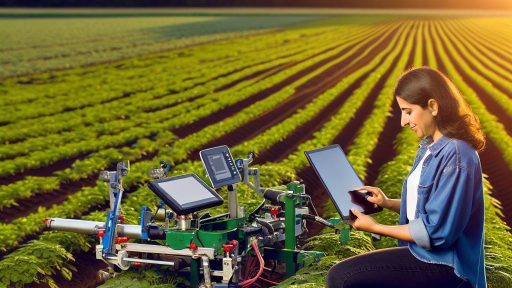Introduction to Farm Management Software
Farm management software plays a vital role in modern agriculture.
This technology streamlines farm processes to enhance productivity.
It helps farmers make informed decisions based on real-time data.
Understanding Its Importance
Farmers face numerous challenges in today’s fast-paced environment.
From climate change to market fluctuations, adaptation is essential.
Farm management software offers valuable solutions to these issues.
Key Features of Farm Management Software
This software typically includes features like field mapping and crop planning.
Farmers can track inventory and manage finances effortlessly.
Moreover, it provides analytics to optimize yields and reduce costs.
Real-World Applications
Many agricultural enterprises benefit from adopting this technology.
For instance, Green Valley Farms uses software for precision agriculture.
It enables them to monitor crop health via satellite imagery.
Consequently, they have improved their harvest quality and efficiency.
Future Trends in Farm Management Software
With technology advancing, software is becoming increasingly sophisticated.
Integration with IoT devices allows for real-time monitoring of conditions.
Transform Your Agribusiness
Unlock your farm's potential with expert advice tailored to your needs. Get actionable steps that drive real results.
Get StartedMoreover, artificial intelligence can predict crop performance based on analytics.
Thus, farmers can anticipate needs and optimize resource use efficiently.
Increased Efficiency
Automating Daily Tasks
Farm management software automates routine farming tasks.
This automation reduces the time spent on manual activities.
Farmers can focus on strategic decision-making instead.
By streamlining operations, productivity gains are substantial.
Enhancing Data Management
Modern farms generate vast amounts of data.
Management software organizes this data effectively.
Farmers access critical insights quickly and easily.
This timely information enhances decision-making processes.
Improving Resource Allocation
Efficient resource management is vital for modern agriculture.
Farm management software optimizes resource allocation.
Farmers can track inputs like water, fertilizers, and seeds.
Consequently, they minimize waste while maximizing yield.
Facilitating Collaboration
Many farms operate with teams of workers.
Management software fosters collaboration among team members.
Real-time data sharing improves communication efforts.
Everyone stays aligned with ongoing farming activities.
Monitoring Equipment Performance
Farm machinery requires regular maintenance and monitoring.
Software helps track equipment usage and performance.
Scheduled maintenance reduces the risk of breakdowns.
This proactive approach enhances overall operational efficiency.
Data-Driven Decision Making
Understanding Analytics in Farming
Modern farming increasingly relies on data analytics.
This shift leads to informed decision-making processes.
Showcase Your Farming Business
Publish your professional farming services profile on our blog for a one-time fee of $200 and reach a dedicated audience of farmers and agribusiness owners.
Publish Your ProfileFarm management software plays a crucial role here.
It collects real-time data from various sources.
Farmers can analyze this data to optimize operations.
Enhancing Crop Yield
Data-driven approaches significantly improve crop yield.
Farmers can identify optimal planting times effectively.
Moreover, they can select suitable crop varieties.
This method tailors practices to specific field conditions.
Consequently, growers witness increased productivity.
Efficient Resource Management
Using analytics aids in efficient resource management.
Farmers can track water usage and soil health precisely.
This data helps in reducing waste and costs.
For example, targeted irrigation strategies minimize water consumption.
Additionally, proper fertilization schedules enhance nutrient uptake.
Predictive Analytics for Future Planning
Predictive analytics is vital for planning future crops.
Farmers can anticipate weather patterns effectively.
This foresight allows them to develop contingency plans.
As a result, risks diminish with better preparedness.
Future farming becomes more resilient and sustainable.
Delve into the Subject: Using Drones To Optimize Farm Productivity
Cost Reduction
Minimizing Operational Costs
Farm management software significantly reduces operational costs for modern farms.
It streamlines various processes, allowing for better resource allocation.
Additionally, farmers can automate routine tasks, saving both time and labor costs.
By improving efficiency, this software minimizes waste and unnecessary expenditures.
Enhanced Decision Making
Data analytics tools provide insights for informed decision making.
Farmers can analyze past performance to predict future outcomes.
This predictive capability helps in planning purchases and investments wisely.
Consequently, it prevents over-spending and enhances budget management.
Efficient Resource Management
Effective monitoring of resources is crucial for cost reduction.
Farm management software enables real-time tracking of inputs and outputs.
This allows farmers to identify underutilized resources quickly.
As a result, they can optimize their use and save on costs.
Reduced Downtime
Farm equipment can suffer from unplanned downtime, leading to lost revenue.
Management software helps schedule regular maintenance proactively.
By preventing equipment failures, farmers save costs associated with repairs.
Moreover, increased machinery uptime enhances overall productivity.
Delve into the Subject: Blockchain For Ethical Sourcing In Agricultural Supply Chains
Real-Time Monitoring
Enhanced Visibility into Farm Activities
Real-time monitoring provides immediate visibility into daily farm activities.
This visibility helps farmers make informed decisions quickly.
Farmers can track planting, irrigation, and harvesting in real-time.
As a result, they can optimize their workflow and boost productivity.
Showcase Your Farming Business
Publish your professional farming services profile on our blog for a one-time fee of $200 and reach a dedicated audience of farmers and agribusiness owners.
Publish Your ProfileData-Driven Decision Making
Access to real-time data supports better decision-making.
Farmers can analyze weather patterns and soil conditions continuously.
This information allows them to adjust strategies effectively.
Consequently, they can improve yields and reduce resource waste.
Remote Monitoring Capabilities
Farm management software enables remote monitoring of farm conditions.
Farmers can use mobile devices to check on operations from anywhere.
This feature enhances flexibility and response times during challenges.
Additionally, it provides peace of mind during times of travel or absence.
Early Detection of Issues
Real-time monitoring helps detect potential problems early.
Farmers can identify irrigation leaks or pest infestations immediately.
Early intervention can save crops and reduce damages.
Moreover, it minimizes the effort and resources needed for recovery.
Improved Resource Management
Real-time data aids in efficient resource allocation.
Farmers can monitor water usage and nutrient applications closely.
This optimization leads to cost savings and sustainable practices.
Ultimately, it fosters a healthier environment for crops and livestock.
Gain More Insights: Machine Learning Applications In Farming

Enhanced Collaboration
Improving Communication Among Team Members
Farm management software enhances communication among farm workers.
It creates a centralized platform for sharing information.
Moreover, this software enables real-time updates on tasks.
Consequently, workers stay informed about changes and requirements.
Connecting Stakeholders Effectively
Farm management software fosters better connections with stakeholders.
It allows for easier sharing of reports and data insights.
Additionally, stakeholders can monitor progress remotely.
This transparency builds trust and ensures accountability.
Facilitating Team Collaboration
The software promotes teamwork by enabling shared goals.
Workers can collaborate on projects without misunderstandings.
Task assignment features help clarify responsibilities.
As a result, productivity on the farm improves significantly.
Streamlining Decision-Making Processes
With farm management software, decision-making becomes more agile.
Data-driven insights help managers make informed choices.
Furthermore, communication tools facilitate quicker feedback.
This accelerates the response to emerging challenges.
Learn More: Integrating Automated Machinery Into Traditional Farming
Sustainability Practices
Eco-Friendly Farming Techniques
Farm management software enhances eco-friendly practices on modern farms.
It provides valuable insights into resource usage and environmental impact.
By utilizing data analytics, farmers can optimize their operations effectively.
This technology supports precision farming methods to reduce waste.
Consequently, it helps in conserving water and minimizing chemical inputs.
Monitoring and Tracking Resources
Software tools allow farmers to monitor resource usage in real-time.
Showcase Your Farming Business
Publish your professional farming services profile on our blog for a one-time fee of $200 and reach a dedicated audience of farmers and agribusiness owners.
Publish Your ProfileThis capability leads to informed decision-making based on accurate data.
By tracking water usage, farmers can implement irrigation practices efficiently.
They can also monitor fertilizer application to ensure optimal usage.
In turn, this reduces runoff and protects local ecosystems.
Data-Driven Decision Making
Using historical data, farmers can identify patterns and trends.
This analysis enables them to make better choices for sustainable farming.
Adaptation of crop rotation schedules is one example of this strategy.
It promotes soil health and reduces pest infestations effectively.
Farm management software empowers farmers to embrace sustainable innovations.
Collaboration with Environmental Experts
Farm management platforms facilitate collaboration with agronomists and ecologists.
This teamwork enhances the implementation of sustainable farming practices.
Such partnerships offer valuable recommendations and best practices.
Farmers can access new technologies and ecological insights easily.
Ultimately, this leads to healthier and more productive farming systems.
Case Studies of Successful Implementations
Tech Innovations in Wheat Farming
Green Acres Farms adopted farm management software in 2021.
This decision streamlined crop monitoring across their extensive fields.
As a result, they improved yield predictions by 30% within a single season.
Furthermore, the software optimized resource allocation, reducing costs significantly.
Enhancing Livestock Management
Sunnyside Ranch implemented farm management software to track livestock health.
This tool enabled them to monitor feed consumption and breeding cycles effectively.
Consequently, the ranch improved overall herd productivity by 25%.
Additionally, they enhanced disease prevention and minimizing veterinary costs.
Data-Driven Decision Making in Organic Farming
FreshFields Organic Farm integrated farm management software for data analysis.
This approach provided insights into soil conditions and crop performance.
As a result, they achieved a 15% increase in crop quality over two years.
Moreover, the software’s forecasting abilities helped them plan planting seasons better.
Managing Precision Agriculture
TechFarm Solutions utilized advanced farm management software for precision agriculture.
This software integrates GPS technology to assess land characteristics.
Ultimately, they enhanced crop monitoring and irrigation efficiency.
Consequently, they reduced water usage by up to 40%, promoting sustainability.
Streamlining Supply Chain Processes
Golden Harvest Farms established a solution to streamline their supply chain management.
By using farm management software, they improved inventory tracking.
Additionally, they shortened time-to-market for their produce significantly.
This software enabled them to better respond to local market demands.
Additional Resources
AI in Agriculture and Farming: Revolutionizing Crop Growth – Intellias




